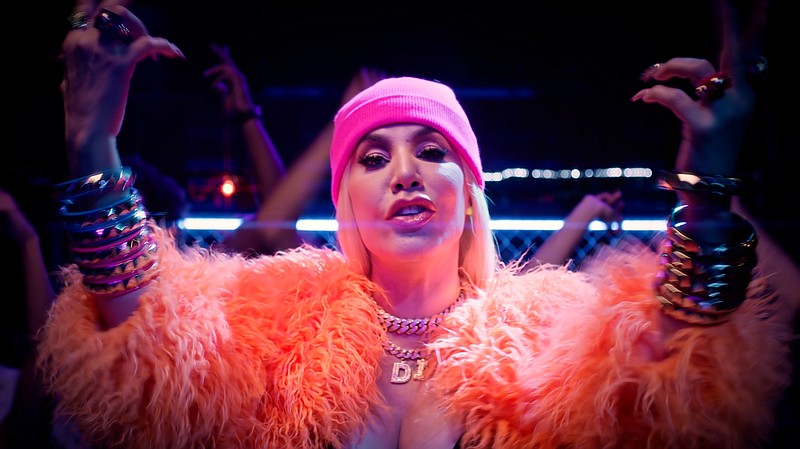Last year, ongoing discussions about police violence and racial injustice prompted a long-overdue reckoning in reggaeton as fans of the massively popular Latin music genre called out contemporary stars — including Bad Bunny and J Balvin — for failing to meaningfully address systemic racism. At the heart of these conversations were the origins of the genre itself, which grew out of marginalized, largely Black communities in Panama and Puerto Rico.
An immersive new podcast, hosted by pioneering emcee Ivy Queen, is further illuminating reggaeton's roots. Produced by Spotify and Futuro Studios, "Loud: The History of Reggaeton" unpacks the genre's rise across decades and multiple countries including the United States and Colombia. "It's a story that touches on race, sex ... life in the streets," Ivy Queen (affectionately known to her fans as La Diva) tells listeners in a mix of English and Spanish. "For some people, reggaeton is just party music, but the real story behind reggaeton is a story about resistance."
As Ivy Queen explains in the first of 10 episodes, it's a story that begins in Panama. That's an important declaration, because for decades a debate has simmered around whether reggaeton began there or in Puerto Rico. "Loud" decisively settles it: "A lot of people don't give credit to the Panamanians, but it all started with them," Ivy Queen says. "If it wasn't for reggae and dance en Espanol, there wouldn't be no reggaeton. End of story."
"Loud" doesn't just dismantle long-held misconceptions about reggaeton — it contextualizes them. Reggae en Espanol was started by Black Panamanians: descendants of West Indian laborers brought to Panama (mainly from Jamaica and Barbados) in the early 1900s to help construct the Panama Canal. Ivy Queen introduces some of the genre's pioneers, including Renato (full name: Leonardo Renato Aulder), who didn't realize they were creating a new music genre when they began translating Jamaican dance-hall songs into Spanish. The burgeoning sound made its way from the dance halls to Panama's "Diablos Rojos" ("Red Devils"), colorful buses that blared music from large speakers.
But reggae en Espanol was more than just dance music. Panamanians of West Indian descent "got discriminated against a lot, for being Black and also for having English-speaking roots," Ivy Queen tells listeners. "They were sometimes treated as if they don't belong to Panama, even though their families had lived there for generations."
That was reflected in the music, clips of which punctuate the podcast's oral history. The first song Renato recorded in a studio was a riff on a dance-hall song about police violence. "El D.E.N.I." invoked the name of a police unit that was notorious for targeting Black Panamanians. Another hit, "La Chica de Los Ojos Cafe," subtly called out the overwhelming whiteness of Latin soap operas.
"For Black kids," Ivy Queen says, "dance hall and reggae became a kind of defiance, a way of saying, like, 'we're going to be as Black as we want.'"
That defiance becomes a recurring theme as "Loud" recounts reggaeton's early years. The podcast sets its second episode in New York, where reggae en Espanol legend El General found an international following through the city's flourishing dance-hall scene, and where Puerto Rican rapper Vico C began his emcee career exclusively in Spanish. The episode also examines the converging influences American and Latin hip-hop had on Puerto Rico. The third episode revisits DJ Negro's now-iconic San Juan nightclub, the Noise, which was pivotal to reggaeton's underground popularity and spawned a collective of the same name.
Even as "Loud" celebrates the formation of reggaeton, it doesn't shy away from exploring the genre's pitfalls — from homophobia to misogyny.
Forthcoming episodes, released weekly, will take a look at the criminalization of reggaeton in those early days, which coincided with increasing drug-related violence and Puerto Rico's "mano duro" (firm hand) crackdown against residents of the Puerto Rico's public housing projects. The podcast will work its way up to reggaeton's takeover of the pop charts — from Daddy Yankee's "Gasolina" to the record-setting "Despacito"; the ubiquity (and origin) of dembow rhythm; and the artists who define reggaeton's sound today. Along the way, listeners will hear from reggaeton pioneers including Nicky Jam and duo Zion and Lennox, along with rising stars such as Rauw Alejandro and Sech.
In one of "Loud's" more exhilarating moments, Ivy Queen recalls auditioning for DJ Negro in 1995 — a make-or-break audition that changed her life and set her on a path to becoming one of the first and most successful female artists in a male-dominated genre.
"I put on the headphones," she recalls. "I'm nervous as hell, but I'm not trying to show it, you know. So I do something kind of crazy. I turn my microphone around, turn my back toward Negro and face the wall. I just let it loose."
The Queen's voice comes through, as commanding as ever, in a stripped-down recording of her 2005 hit "Muchos Quieren Tumbarme." "Congratulations," she recalls DJ Negro telling her. "You're in."
Ivy Queen makes for a lively host but it's her love of reggaeton that comes through the most. "From that day on, I was one of the people who was responsible for creating a genre, a culture," she tells listeners. "People who came from nothing and struggled and made something new — something fresh, something beautiful — something for the whole world to dance (to)."
